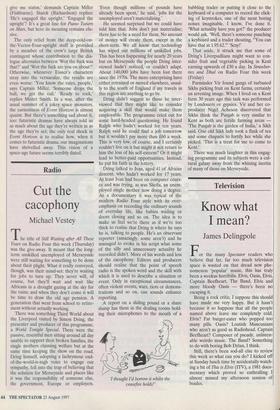Radio
Cut the cacophony
Michael Vestey
The title of Still Waiting after All These Years on Radio Four this week (Thursday) was the give-away. It meant that the long- term unskilled unemployed of Merseyside were still waiting for something to be done about their plight. What it really conveyed, though, was their mind-set: they're waiting for jobs to turn up. They never will, of course, but they'll wait and wait like Africans in a drought gazing at the sky for the rains; and when they don't come it will be time to draw the old age pension. A generation that went from school to retire- ment without actually working.
There was something Third World about the Liverpool visited by Simon Dring, the presenter and producer of this programme, a World Tonight Special. There were the passive, resentful men sitting around all day unable to support their broken families, the single mothers claiming welfare but at the same time keeping the show on the road. Dring himself, adopting a lachrymose end- of-the-world-is-nigh voice to engage our sympathy, fell into the trap of believing that the solution for Merseyside and places like it was the responsibility of someone else, the government, Europe or employers. `Even though millions of pounds have already been spent,' he said, 'jobs for the unemployed aren't materialising.'
He seemed surprised but we could have told him that. Jobs don't just materialise; there has to be a need for them. No amount of money will create them, except in the short-term. We all know that technology has wiped out millions of unskilled jobs. This has been happening for nearly 20 years but on Merseyside the people Dring inter- viewed hadn't noticed, or couldn't adapt. About 140,000 jobs have been lost there since the 1970s. The more enterprising have either retrained or moved elsewhere, usual- ly to the south of England if my travels in this region are anything to go by.
Dring didn't suggest to those he inter- viewed that they might like to consider acquiring a skill that would make them employable. The programme cried out for some hard-headed questioning. He found Ralph who hadn't worked for ten years. Ralph said he could find a job tomorrow but it wouldn't pay more than £60 a week. This is very low, of course, and I certainly couldn't live on it but might it not return to him the loss of his self-esteem? Or it might lead to better-paid opportunities. Instead, he put his faith in the lottery.
Dring talked to Ivan, aged 41 of African descent, who hadn't worked for 17 years. At least Ivan had been on computer cours- es and was trying, as was Sheila, an unem- ployed single mother now doing a degree. As a documentary it was typical of the modern Radio Four style with its over- emphasis on recording the ordinary sounds of everyday life, like babies wailing or doors closing and so on. The idea is to make us feel we're there as if we're too thick to realise that Dring is where he says he is, talking to people. He's an observant reporter (amazingly, some aren't) and he managed to evoke in his script what some of the silly and unnecessary actuality he recorded didn't. More of his words and less of the cacophony. Editors and producers should realise that the point of speech radio is the spoken word and the skill with which it is used to describe a situation or event. Only in exceptional circumstances, often violent events, wars, riots or demons- trations and so on, can sounds enhance reporting.
A report on a sliding pound or a share slump has them in the dealing rooms hold- ing their microphones to the mouth of a I thought I'd borrow it whilst the ceasefire holds!' babbling trader or putting it close to the keyboard of a computer to record the click- ing of keystrokes, one of the most boring noises imaginable. I know, I've done it. `What actuality have you got?' the producer would ask. 'Well, there's someone punching a keyboard and a trader shouting, "You can have that at 1.95.62.""Sexy!'
That aside, it struck me that some of Dring's Liverpudlians might want to con- sider fruit and vegetable picking in Kent earning upwards of £30 a day. In Strawber- ries and Dhal on Radio Four this week (Friday) Parminder Vir found gangs of turbaned Sikhs picking fruit on Kent farms, certainly an arresting image. When I lived on a Kent farm 30 years ago this task was performed by Londoners or gypsies. Vir and her co- producer Nigel Acheson discovered that Sikhs think the Punjab is very similar to Kent as both are fertile farming areas 'The Punjab is the garden of India,' a Sikh said. One old Sikh lady took a flask of tea and some chapatis to fortify her while she picked. 'This is a treat for me to come to Kent.'
There was much laughter in this engag- ing programme and its subjects were a cul- tural galaxy away from the whining inertia of many of those on Merseyside.


























































 Previous page
Previous page